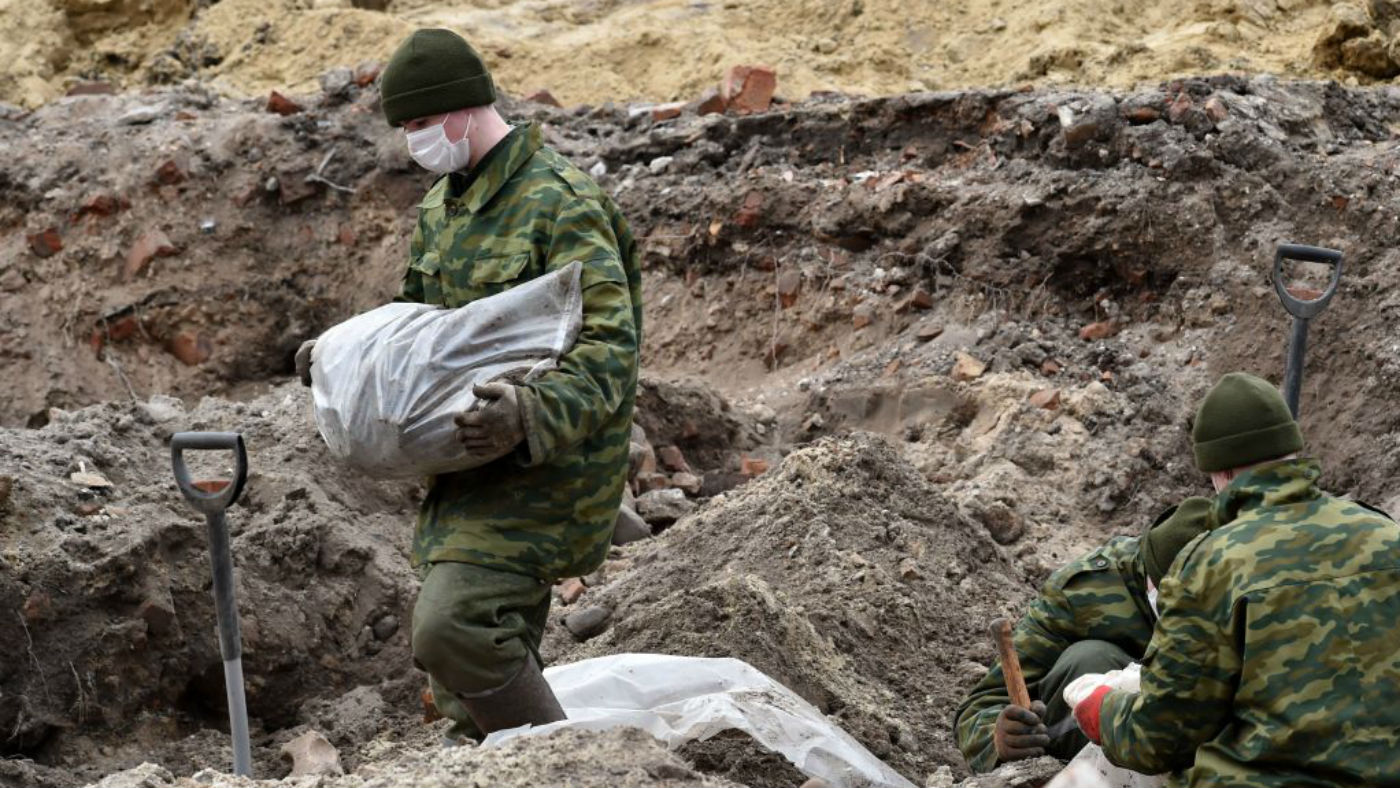Hundreds of bodies found in Nazi-era mass grave in Belarus
Discovery made during construction work at site of WWII Jewish ghetto

A free daily email with the biggest news stories of the day – and the best features from TheWeek.com
You are now subscribed
Your newsletter sign-up was successful
The bodies of hundreds of Nazi mass murder victims have been unearthed from a mass grave on the site of a Second World War-era Jewish ghetto in Belarus.
The first remains were uncovered last month during construction work in the southwestern city of Brest, with dozens more discovered every day since. Dmitry Kaminsky, a soldier involved in the operation, told Agence France-Presse that the bones of 790 bodies have been exhumed so far, along with personal items.
Brest Mayor Alexander Rogachuk said the remains were believed to be those of Jews from a ghetto that was established in 1941 by Nazi German occupiers in the border city, then part of Poland.
The Week
Escape your echo chamber. Get the facts behind the news, plus analysis from multiple perspectives.

Sign up for The Week's Free Newsletters
From our morning news briefing to a weekly Good News Newsletter, get the best of The Week delivered directly to your inbox.
From our morning news briefing to a weekly Good News Newsletter, get the best of The Week delivered directly to your inbox.
During the War, the Nazis killed around three million civilians in Belarus, of whom 800,000 were Jewish, reports the Jewish Telegraphic Agency (JTA).
On 15 October 1942, Nazi soldiers loaded 20,000 Jews from Brest onto railcars and transported them to Bronnaya Gora, about halfway between Brest and Minsk, where pits had been prepared, says the Smithsonian magazine. “The Jews of Brest were then shot and dumped into the pits, along with 30,000 Jews from other cities and regions,” according to the Washington DC-based magazine.
When the Soviets liberated Brest in 1944, they found that only nine Jewish residents had survived the War.
Following last month’s discovery of the mass grave, the Brest mayor “is in contact with local and international Jewish groups about arranging burial for the bones at local Jewish cemeteries”, says JTA.
A free daily email with the biggest news stories of the day – and the best features from TheWeek.com
The news site adds that in recent years, Belarusian authorities have faced allegations of improper handling of Jewish and Holocaust historic sites. Officials and contractors provoked outrage by destroying three synagogues, and building on top of Jewish cemeteries, despite Jewish religious laws against disturbing human remains.
Vice reports that the disregard for Holocaust victims dates back to the postwar Soviet occupation, when the Communist regime sought to minimise, if not erase, Jewish culture and identity. During the 1950s and 1960s, scores of Jewish cemetaries were dismantled to build housing estates, sports stadiums and supermarkets.
“Jewish graves have since been discovered in the make-up of Brest’s road surfaces, pavements and gardens,” says the news website.
Around 1,500 headstones have been recovered from around the city since 2014, with many now in storage to be used in a prospective memorial.
-
 ‘Restaurateurs have become millionaires’
‘Restaurateurs have become millionaires’Instant Opinion Opinion, comment and editorials of the day
-
 Earth is rapidly approaching a ‘hothouse’ trajectory of warming
Earth is rapidly approaching a ‘hothouse’ trajectory of warmingThe explainer It may become impossible to fix
-
 Health insurance: Premiums soar as ACA subsidies end
Health insurance: Premiums soar as ACA subsidies endFeature 1.4 million people have dropped coverage
-
 Epstein files topple law CEO, roil UK government
Epstein files topple law CEO, roil UK governmentSpeed Read Peter Mandelson, Britain’s former ambassador to the US, is caught up in the scandal
-
 Iran and US prepare to meet after skirmishes
Iran and US prepare to meet after skirmishesSpeed Read The incident comes amid heightened tensions in the Middle East
-
 Israel retrieves final hostage’s body from Gaza
Israel retrieves final hostage’s body from GazaSpeed Read The 24-year-old police officer was killed during the initial Hamas attack
-
 China’s Xi targets top general in growing purge
China’s Xi targets top general in growing purgeSpeed Read Zhang Youxia is being investigated over ‘grave violations’ of the law
-
 Panama and Canada are negotiating over a crucial copper mine
Panama and Canada are negotiating over a crucial copper mineIn the Spotlight Panama is set to make a final decision on the mine this summer
-
 Why Greenland’s natural resources are nearly impossible to mine
Why Greenland’s natural resources are nearly impossible to mineThe Explainer The country’s natural landscape makes the task extremely difficult
-
 Iran cuts internet as protests escalate
Iran cuts internet as protests escalateSpeed Reada Government buildings across the country have been set on fire
-
 US nabs ‘shadow’ tanker claimed by Russia
US nabs ‘shadow’ tanker claimed by RussiaSpeed Read The ship was one of two vessels seized by the US military